The plane tilts in to Nashville,
coming over the green lights
like a toy train skipping past
the signals on a track.
The city is livid with lights,
as if the weight of all the people
shooting down her arteries
had inflamed them.
It's Friday night,
and people are home for the homecomings.
As I come into the terminal,
a young black man, in a vested gray suit,
paces in the florid Tennessee air,
breaks into a run like a halfback
in open field, going past the delirious faces,
past the poster of Molly Bee
in her shiny chaps, her hips tilted forward
where the guns would be, her legs set,
as if she would run, as if she were
a cheerleader who doffs her guns
on Saturday afternoon and careens
down the sidelines after some broken field runner,
who carries it in, for now,
for all the state of Tennessee
with its nut-smelling trees,
its stolid little stone walls
set out under thick blankets of leaves,
its crisp lights dangling on the porches
of homes that top the graveled driveways,
where people who cannot yodel or yell
putter in the grave October afternoons,
waiting for Saturday night and the lights
that spatter on Molly Bee's silver chaps.
I don't want to think of them,
or even of the broken field runner in the terminal,
still looking for his girl, his pocket
full of dates and parties, as I come
into this Friday night of homecomings
and hobble over the highway in a taxi
that has its radio tuned to country music.
I come up to the campus,
with a large wreath jutting up
under the elegant dormitories,
where one girl sits looking down at the shrieking cars,
as the lights go out, one by one, around her
and the laughter drifts off, rising, rising,
as if it would take flight away
from the livid arteries of Nashville.
Now, in sleep, I leave my brass-headed bed,
and see her enter with tall singers,
they in African shirts, she in a robe.
She sits among them, as a golden lance
catches her, suddenly chubby, with soft lips
and unhurried eyes, quite still in the movement
around her, waiting, as the other voices fade,
as the movement stops, and starts to sing,
her voice moving up from its tart entrance
until it swings as freely
as an ecstatic dancer's foot,
rises and plays among the windows
it would with angels and falls,
almost visible, to return to her,
and leave her shaking with the tears
I'm ashamed to release, and leave her
twisting there on that stool with my shame
for the livid arteries, the flat Saturdays,
the inhuman homecomings of Nashville.
I kneel before her. She strokes my hair,
as softly as she would a cat's head,
and goes on singing, her voice shifting
and bringing up the Carolina calls,
the waterboy, the railroad cutter, the jailed,
the condemned, all that had been forgotten
on this night of homecomings, all
that had been misplaced in those livid arteries.
She finishes, and leaves,
her shy head tilted and wrinkled
in the green-tinged lights of the still campus.
I close my eyes and listen,
as she goes out to sing this city home.
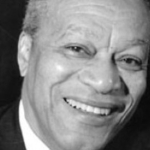










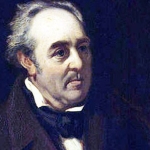
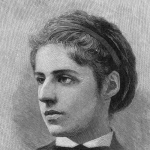
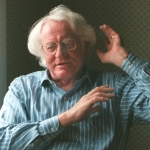
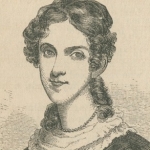
Comment form: